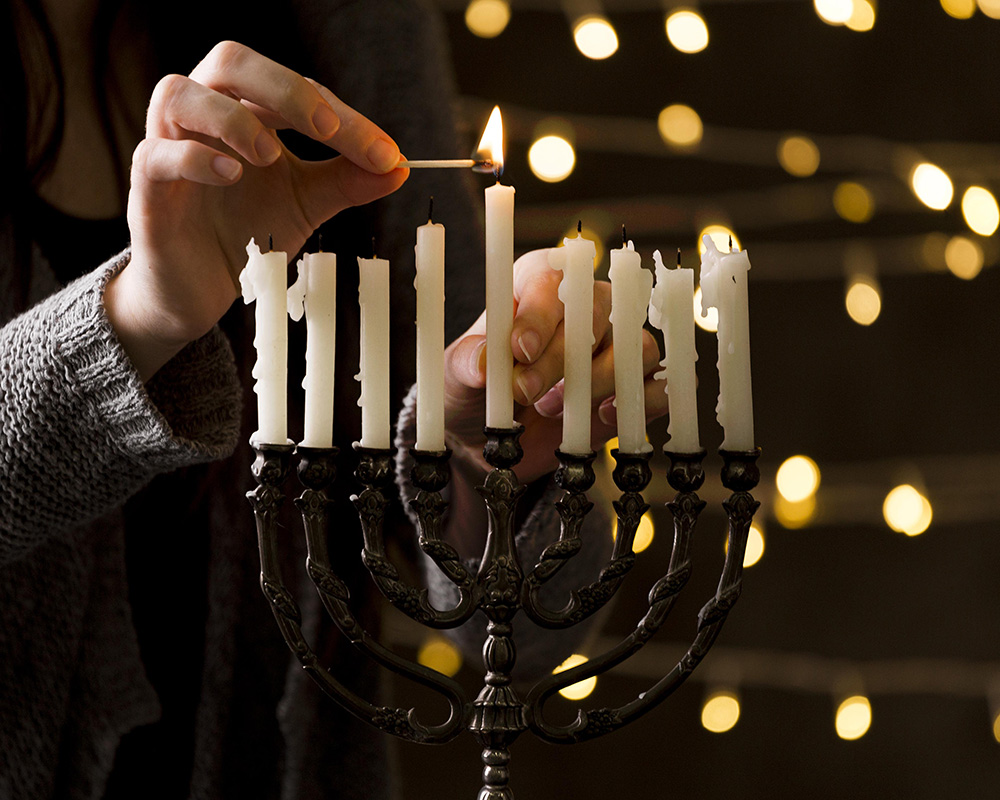11 Tips for Making the Most of this Holiday Season as a Caregiver
Being a family caregiver can be challenging at the best of times, and between the regular pressures of the holiday season along with the compounding stress of the pandemic, this year is looking unlike any other.
Here are 11 tips for making the most of this holiday season, whether you’re celebrating Hanukkah, Christmas, or another holiday:
- Have compassion for yourself. There is a lot of pressure we put on ourselves during the holidays, and this year we’re trying to figure out all the logistics during a pandemic no less. You are doing the best you can. Treat yourself with kindness. What would you say to a friend who is a caregiver at this time? Make sure you apply this advice to yourself as well.
 Make time for virtual celebrations. Just because you can’t physically be with extended family this holiday season doesn’t mean you can’t connect. Learn how to use ZOOM or Skype, or send an e-card. Do virtual activities such as sharing a meal, or watching a movie together. If you’re caring for someone living with dementia, here’s a helpful video from the Alzheimer’s Society on how to make the most of a virtual visit/video chat.
Make time for virtual celebrations. Just because you can’t physically be with extended family this holiday season doesn’t mean you can’t connect. Learn how to use ZOOM or Skype, or send an e-card. Do virtual activities such as sharing a meal, or watching a movie together. If you’re caring for someone living with dementia, here’s a helpful video from the Alzheimer’s Society on how to make the most of a virtual visit/video chat.
- It’s never too late to start a new holiday tradition. Instead of focusing on what you and your loved one can no longer do due to pandemic restrictions (or because of your loved one’s physical/cognitive restrictions) – think of what new activities you CAN do. Build on each other’s strengths, and discover new activities to do together. You could sing holiday songs, go for a walk around the neighbourhood (or look out the window) at decorated houses, or cook a traditional dish together.
- Give yourself permission to feel. Holiday perfectionism is part of our culture – just think of every holiday movie out there. We put a lot of pressure on trying to put on the perfect holiday for our loved ones, and if we feel terrible if we don’t “succeed” at this. Identify the perfectionist thoughts when they come up, pause, and replace them with a counter-thought such as “the holidays are never perfect for anyone!” Don’t stuff down your feelings – it’s okay to have a lot of different feelings this time of year – everything from sadness, fear, and pain, to joy and laughter. These are all perfectly normal and permissible during the holidays.
- Help your family members manage their holiday expectations. Letting family members know how you and your loved one are doing before a virtual event allows everyone to prepare and minimizes stress on everyone’s part. This is particularly important if your loved one has dementia and their symptoms have changed. This will reduce the shock they may feel, and help the virtual event go more smoothly.
 Don’t forget what matters most to YOU about the holidays. Reflect on what it is you enjoy about the holidays and take part in that in some way! Often times we try to make everyone else happy during the holidays, but what also brings YOU joy at this time? Brainstorming a list can help. If you enjoy the reaction on people’s faces when you give them a gift, make sure they record themselves as they open your gift and send the video to you – or have everyone open their presents on a video call. And if you need help with online shopping, ask a family member or friend to help you – you can even have gifts shipped directly to your family members’ homes!
Don’t forget what matters most to YOU about the holidays. Reflect on what it is you enjoy about the holidays and take part in that in some way! Often times we try to make everyone else happy during the holidays, but what also brings YOU joy at this time? Brainstorming a list can help. If you enjoy the reaction on people’s faces when you give them a gift, make sure they record themselves as they open your gift and send the video to you – or have everyone open their presents on a video call. And if you need help with online shopping, ask a family member or friend to help you – you can even have gifts shipped directly to your family members’ homes!
- Be in the moment. Sometimes we have idealized visions of previous holidays. Try to put those where they are – in the past. This may be a holiday unlike any other, so try to focus on the joys of the holiday no matter how small they may be THIS year rather than thinking back to previous holidays, or thinking ahead to future holidays.
- Practice mindfulness with a holiday twist to stay grounded this season. Use your senses to stay in the moment: Enjoy holiday lights or decorations? Spend time intentionally admiring them in detail. Enjoy holiday food? Focus on savoring each bite of your favorite dish and identify the different flavours you taste. Enjoy the sounds of holiday music? Listen to holiday music and try to hear all the different instrumentals. Focus on “simple pleasures.”
- Intentionally practice gratitude. Small moments of appreciation, and particularly practicing gratitude through activities such as writing gratitude letters, lists, or keeping a gratitude journal can re-wire your brain in a positive way. It can actually increase your determination, attention, enthusiasm, and energy. Try a small practice of gratitude related to the holidays to help you feel less stressed at this time. Starting with ACCEPTANCE of the here and now can lead to feelings of gratitude.
- Give yourself a gift – the gift of self-care. This could be anything you enjoy – a movie, a piece of chocolate, a day where you wear your favourite outfit, anything that would be a “treat” for you.
- Keep a regular routine. The holidays can sometimes throw off routine due to the activities or excitement, and lead to less sleep for your or your loved one, which can affect mood. You many try actually scheduling in rest time. And if your loved one has dementia, try to schedule any activities or video calls for earlier in the day to avoid sundowning behaviours.


